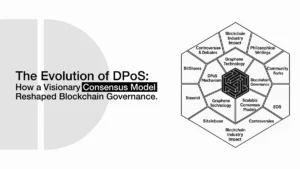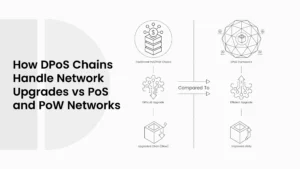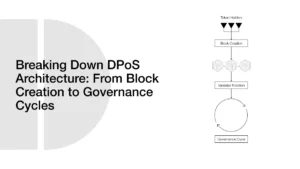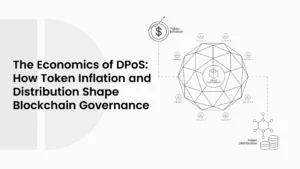Why DPoS Tokens Rise and Fall: The Hidden Connection Between Voting Power and Market Value
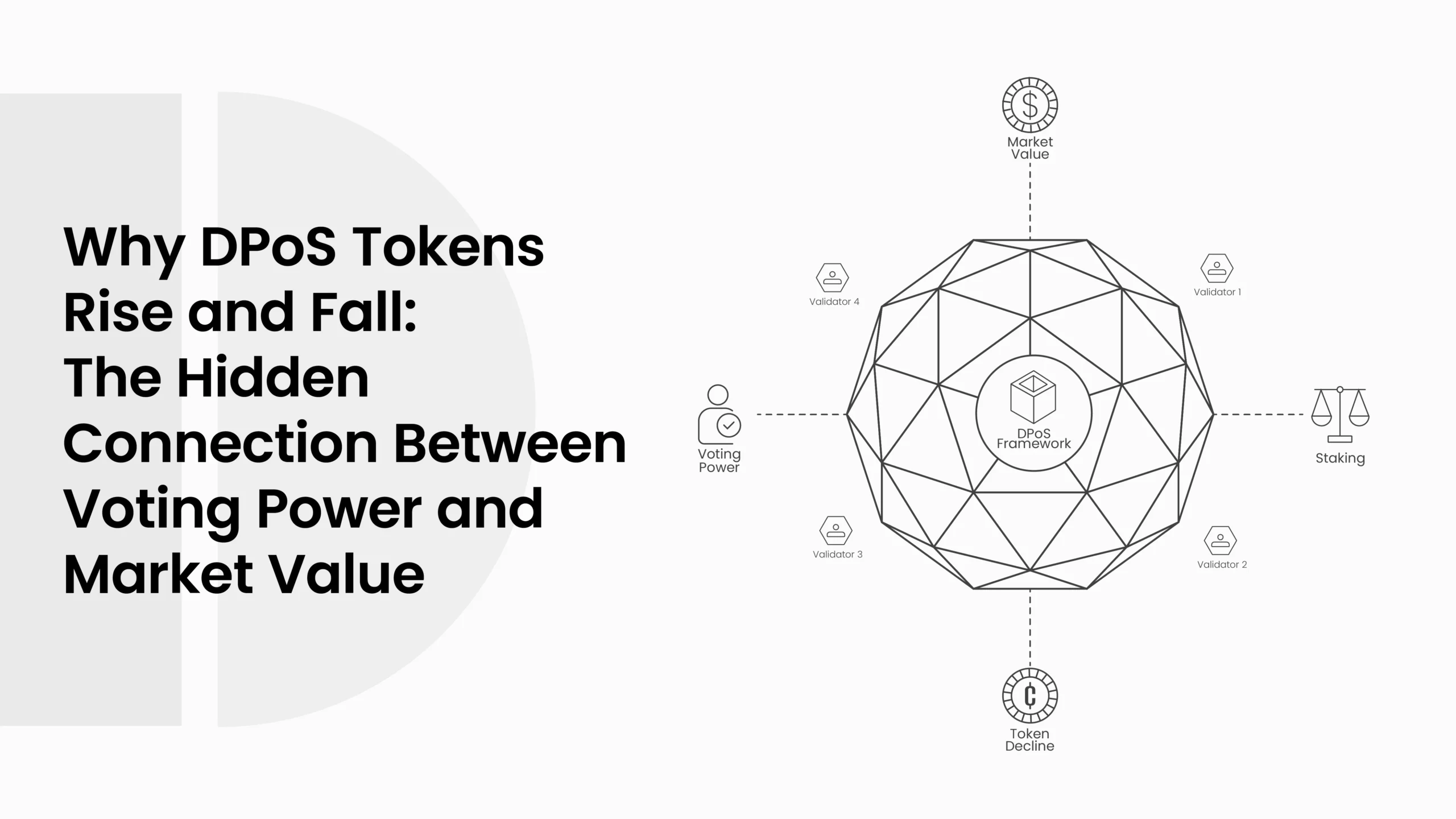
Delegated Proof of Stake (DPoS) changed the consensus mechanism of blockchains by combining technology with governance. Instead of just mining or simple staking, it works on a system of voting, performance, and trust. It made blockchains faster and more scalable, but also gave more power to those holding tokens. Validators get chosen through votes, and that makes every decision, every reward, and every missed block tied to community support. It’s not only about running the network anymore; it’s about running it with reputation and social trust.
- DPoS Governance and Token Utility
- How Voting Power Works in DPoS
- Why Token Utility Affects Price
- The Scarcity Effect of Staking and Locked Supply
- How Locked Tokens Create Scarcity
- Why DPoS Staking Is More Than Just Earning Rewards
- The Feedback Loop of Token Price and Voting Power
- When High Prices Lead to High Power
- Why It Can Hurt Decentralization
- Reward Incentives and Market Speculation
- Market Reputation and Validator Performance
- Community Engagement and Credit-Based Systems
- AI and Token Performance Optimization
- Investor Sentiment and Long-Term Viability
- Conclusion
- Frequently Asked Questions About DPoS and Token Price
- Does staking in DPoS increase the token price?
- Can validator rewards change the token value?
- Why do some DPoS tokens fall in price even with high activity?
- How is voting power linked to price?
- Does community support really affect DPoS prices?
- Can AI truly help stabilize the token price?
However, DPoS didn’t just change how blocks are created; it also altered how token prices fluctuate. The system introduces new rules to token economics, such as the amount of tokens locked, who controls voting, and how rewards are distributed. All these small things affect how a token behaves in the market. When people stake, trade, or vote, they also shape token demand and supply without even realizing it. That’s why DPoS tokens sometimes rise fast when community trust grows, and fall just as quickly when governance breaks down.
ALSO READ: 8 Reasons a Validator Loses Your Vote in a DPoS System
DPoS Governance and Token Utility
Delegated Proof of Stake (DPoS) is not just about fast blocks or energy savings; it’s about giving decision power to token holders. The system combines governance with economics, making every token a dual-purpose financial and political tool. Because votes determine who runs the network, and rewards depend on performance, the value of a token often correlates directly with how well governance functions.
How Voting Power Works in DPoS
In DPoS networks, token owners don’t create blocks themselves. Instead, they elect a few delegates or validators who act on their behalf. The more tokens a person holds, the stronger their voting power becomes. This sometimes gives big investors more influence over who becomes a validator, shaping the whole network’s direction. It’s a system where ownership equals authority, and that balance can easily shift if a few people hold too much control.
Why Token Utility Affects Price
The price of a DPoS token is often tied to its utility for voting and governance. Since people need tokens to take part in decision-making, many buy and hold them during key voting periods. That rush in demand can cause prices to climb rapidly, mainly when major governance updates or new delegate elections occur. When the community is active and engaged, the market typically reacts, sometimes with excitement, and sometimes with sudden spikes that demonstrate the close connection between value and participation in DPoS systems.
The Scarcity Effect of Staking and Locked Supply
Staking plays a significant role in determining how token prices fluctuate within Delegated Proof of Stake (DPoS) systems. When people stake their tokens to vote for validators, those tokens are locked away for a while. This means they can’t be traded on the open market. As a result, the supply of available tokens decreases, and when demand remains the same or increases, the price typically starts to rise. This shortage often appears during major network events or high-reward staking campaigns, when everyone rushes to participate.
ALSO READ: All You Need to Know About DPoS Node Requirements
How Locked Tokens Create Scarcity
When tokens are staked, they are removed from the trading pool and become part of the network’s security and voting process. The more tokens that are locked, the fewer are left in circulation. It’s the same basic idea as supply and demand, when something becomes harder to get, its value often goes up. Many investors view staking periods as opportunities for price growth, especially when new updates, governance votes, or reward programs attract a wave of stakers, further reducing liquidity.
Why DPoS Staking Is More Than Just Earning Rewards
Unlike yield farming in DeFi, where people primarily chase profit, staking in DPoS provides both financial benefits and influence. When someone stakes tokens, they not only earn returns but also gain the right to vote and shape the network’s future. This mix of reward and responsibility makes DPoS tokens more appealing, especially during important governance moments. It’s not just about passive income; it’s about having a say in how the blockchain grows, and that makes the token more valuable to hold.
The Feedback Loop of Token Price and Voting Power
One of the most interesting yet challenging aspects of Delegated Proof of Stake (DPoS) is how token price and voting power continually influence each other. When the value of a token goes up, it doesn’t just make holders richer; it also gives them more control in governance. This loop can perpetuate the rich getting richer in terms of both wealth and influence, shaping how decisions are made and who remains in control of the network.
When High Prices Lead to High Power
As token prices rise, big holders gain even stronger voting influence. They can easily re-elect themselves or help their close validator allies stay in position. This allows them to maintain control over block production, rewards, and key proposals. It’s not always done with evil intent, but it slowly builds an inner circle of decision-makers. Over time, that tight group becomes harder to replace, creating a soft monopoly over the governance process.
Why It Can Hurt Decentralization
When new participants try to join, they often find it tough to compete with long-standing validators who already have money and votes stacked in their favor. This creates what’s called governance inertia, where the same few players keep ruling the system. Many in the blockchain space see this as a move away from true decentralization. It can cause investors and communities to lose trust, leading to token prices dropping or markets reacting sharply. The only real fix is to rotate validators fairly and improve voting systems so everyone has a voice, not just the wealthy few.
ALSO READ: Can DPoS Be Hacked? Your Ultimate Guide to Risks and Security
Reward Incentives and Market Speculation
Validator reward structures in DPoS also affect token price movements. Some validators share block rewards with voters, incentivizing token holders to stake with them. These payouts often create a competitive environment, where delegates promote higher returns to attract more votes. This triggers capital flows into the token ecosystem as users buy tokens just to stake them for rewards.
However, such reward-chasing behavior introduces volatility. If voters constantly switch validators in search of better returns, staking patterns become unstable, and the token’s market value follows suit. Moreover, speculative traders tend to front-run delegate announcements or governance proposals, buying in early and selling once rewards are realized. This pattern contributes to short-term price spikes, followed by inevitable corrections, which adds to the token’s volatility profile.
Market Reputation and Validator Performance
The reputation of validators and the credibility of governance decisions directly influence market sentiment, and by extension, token valuation. The delegates’ uptime, their active involvement in governance, and open communication with the community help strengthen confidence in the DPoS system. This confidence typically translates to increased user participation and token retention, thereby stabilizing price performance.
Quite the contrary, if one of the highest-ranking validators is detected to be misbehaving, buying votes, manipulating rewards, or engaging in centralized collusion, it undermines the legitimacy of the network. Such failures of governance by the market can occur very rapidly. Traders can dump the tokens, as they are afraid of the risks associated with long-term governance or a reputation downfall. In this way, validator ethics and reliability are not just operational concerns; they are price-sensitive variables.
Community Engagement and Credit-Based Systems
Community-driven governance strengthens token value over time. Studies such as “Delegated Proof of Stake Consensus Mechanism Based on Community Discovery and Credit Incentive” (Zhao et al., 2023) highlight the role of credit incentives in preventing validator monopolies. By distributing voting power based on historical behavior and engagement, the protocol can encourage decentralization and long-term price stability.
Networks like EOS and Steem have faced backlash for validator cartels, leading to forked chains and market depreciation. Conversely, newer DPoS models that reward transparency, community education, and open-source development tend to foster stronger price resilience. The token value in such systems reflects more than supply-and-demand economics; it captures the health of the governance culture itself.
AI and Token Performance Optimization
A recent study by Rizal and Kim (2025), “Enhancing Blockchain Consensus Mechanisms: A Comprehensive Survey on Machine Learning Applications and Optimizations”, argues that AI can be integrated into consensus to forecast validator performance and optimize staking patterns. This has direct implications for the predictability of token prices. By utilizing machine learning, networks can mitigate slashing risks, enhance uptime, and even identify potential malicious behavior, thereby increasing overall market confidence.
The researchers emphasize that while AI brings performance benefits, it must be deployed carefully to avoid centralization or computation overload. AI-based delegation frameworks that strike a balance between efficiency and transparency could lead to more informed governance participation and reduced volatility, supporting more sustainable token price appreciation.
Investor Sentiment and Long-Term Viability
Token price in a DPoS ecosystem is also driven by broader investor sentiment regarding the project’s long-term governance model. Projects that continually update their voting logic, cap validator powers, and publish delegate performance metrics attract more serious capital. Institutional investors, in particular, are more likely to engage with networks that mitigate vote centralization risks through technical or social innovations.
ALSO READ: The Economics of DPoS: How Token Inflation and Distribution Shape Blockchain Governance
In contrast, networks that ignore governance stagnation often see token prices lag behind those of competitors, even with superior transaction speeds or throughput. The perception of a vibrant, accountable validator set plays a crucial role in user confidence and overall market appeal. Hence, DPoS governance models that adapt and evolve tend to outperform in token valuation over time.
Conclusion
The relationship between DPoS and token price is both structural and psychological in nature. From locked supply mechanics and yield incentives to community trust and validator ethics, each aspect of the DPoS framework plays a role in shaping token market dynamics. While DPoS offers efficiency and democratized participation, it also demands continuous refinement to prevent power concentration and ensure long-term price integrity.
Ultimately, token price in a DPoS system becomes a reflection not just of utility or scarcity, but of governance health, delegate performance, and the network’s ability to self-correct. As blockchain ecosystems mature, understanding these correlations will become essential for developers, traders, and governance participants alike.
Frequently Asked Questions About DPoS and Token Price
Does staking in DPoS increase the token price?
Yes, it can. When many users stake tokens, a smaller supply remains on exchanges. This makes the token rarer and can drive the price higher if demand remains strong.
Can validator rewards change the token value?
Yes. When validators offer big rewards, more people buy tokens to stake. That causes small price jumps. But if rewards keep changing, the price gets unstable.
Why do some DPoS tokens fall in price even with high activity?
Because bad governance or unfair validator control can scare investors, even if the tech works fine, people stop trusting the system.
How is voting power linked to price?
Big holders get more voting weight. If they control most votes, they also control decisions. This power can sometimes intimidate new investors and slow price growth.
Does community support really affect DPoS prices?
Yes, it matters a lot. A strong community means more staking, more transparency, and less drama. That usually helps the token price stay healthy longer.
Can AI truly help stabilize the token price?
AI can monitor validator behavior, predict potential issues, and mitigate risks. However, it must be used correctly, or it could lead to overly centralized governance.

